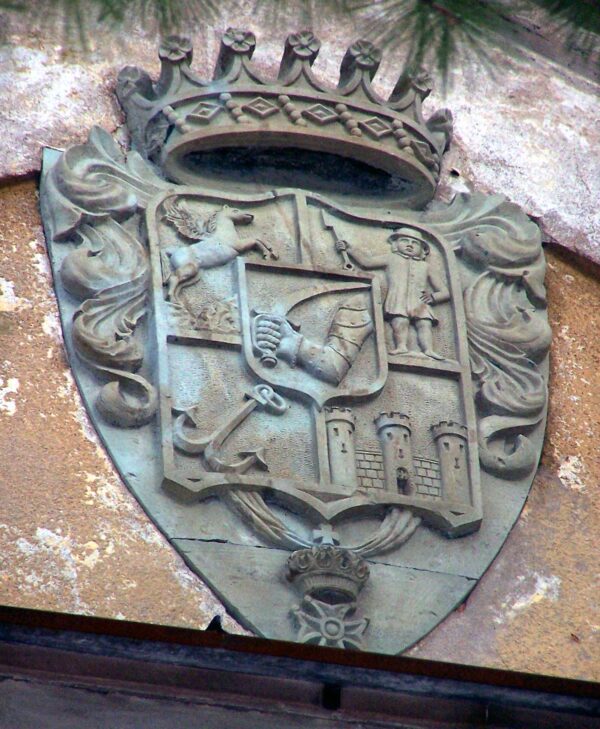
Coat of arms of the Barons Dietrich in Neuhaus Mansion
TRžIč, NEUHAUS MANSION
Location of the coat of arms: attic
Josef Dietrich was born in Vienna in 1780 to a housemaster Konrad Dietrich and Elisabeth Kriecher. Initially engaging in transport, he made a great fortune during the Napoleonic Wars by renting out his highly sought-after transport services (especially to the army). In 1819, he was raised to the rank of Hungarian nobility based on his merit and wealth. Five years later, he obtained the baronial title (on that occasion, his coat of arms was added the middle helmet and the bent arm), and a year after that Emperor Franz, acting as Hungarian king, granted him the Barakony estate in the Arad County. Baron von Dietrich owned several other seigniories in Hungary (e.g., Pankota, Magyarad, and Apathy) and in Lower Austria (e.g., Castle Feistritz am Wechsel and Thomasberg) and purchased a scythe factory in Spittal am Semmering and a steelworks establishment in Mürzzuschlag. He also engaged in money lending, which ultimately led him to Tržič in Upper Carniola in 1819.
Unprofitable investments and disasters that struck Tržič (a fire in 1811) pushed the local castellan, Josef Count von Radetzky, into an enormous debt, which forced him to borrow even more, including from Josef Baron von Dietrich, who became his principal creditor. Radetzky ultimately filed for bankruptcy. In January 1819, he concluded a contract with Dietrich, ceding to him all income from his estate in usufruct; however, still falling short of repaying his debt, in November he also sold—or, better, handed over—his entire Tržič estate to Dietrich, along with all rights and claims arising from it.
Unlike Radetzky, Baron von Dietrich avoided high risk investments and preferred to collect profits from his existing establishments. He did, however, splurge on his residences. He also remodeled Neuhaus Castle on the hill overlooking Tržič and had his coat of arms carved on it in lasting memory.
While a successful businessman, Baron von Dietrich was less lucky in his private life. His marriage to Anna von Béra produced two daughters, of which the younger one, Wilhelmina, died at the tender age of four. The older daughter, Anna, benefited from her father’s wealth and married a prominent man, Polish Prince Ludwik Sułkowski, who owned the estate in Bielsko (modern Bielsko-Biała). Their son, Prince Józef Sułkowski, was the main heir of his grandfather’s immense fortune valued at eight million florins.
Following Baron von Dietrich’s death in Vienna in July 1855, the family became extinct, and the property that he had accumulated his entire life was dispersed. Neuhaus was inherited by Dietrich’s grandson Józef Sułkowski, who sold it to the Carniolan Industrial Company no later than 1873.
Sources:
Preinfalk, Miha: Jožef baron Dietrich in njegove povezave z rodbino Sulkowski. In: Zapomniani książęta?: Sułkowscy w XVIII-XX wieku (ed. Dariusz Nawrot, Grzegorz Madej). Katowice: Wydawnictwo Uniwersytetu Śląskiego, 2016, pp. 143–163.
Preinfalk, Miha: Tržiški graščak – Jožef Dietrich in njegov grb. In: Tržičan, year 12, Nr. 2 (2. 3. 2009), p. 33.
Rugále, Mariano & Preinfalk, Miha: Blagoslovljeni in prekleti. 1. del: Plemiške rodbine 19. in 20. stoletja na Slovenskem. Ljubljana: Viharnik, 2010, pp. 54–56.
